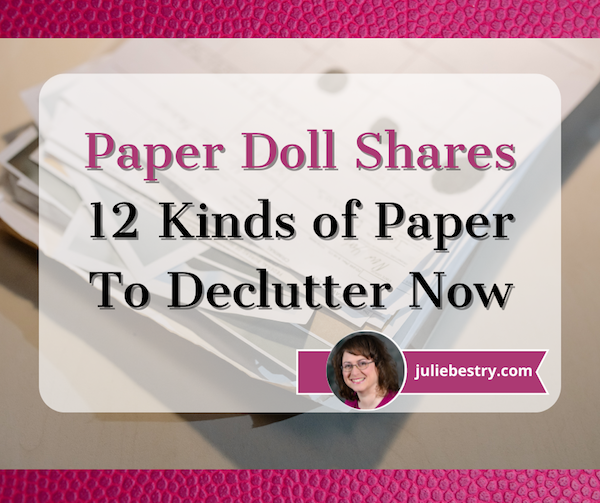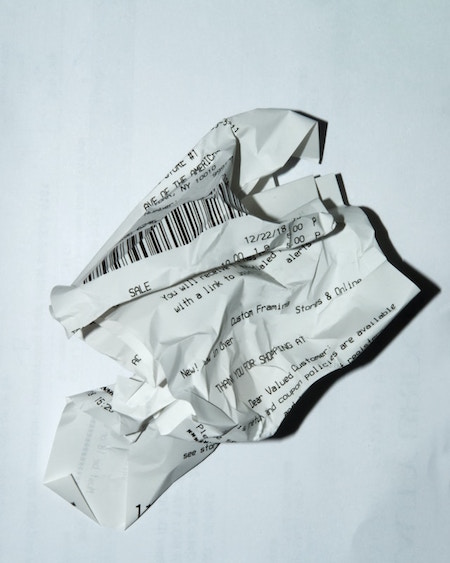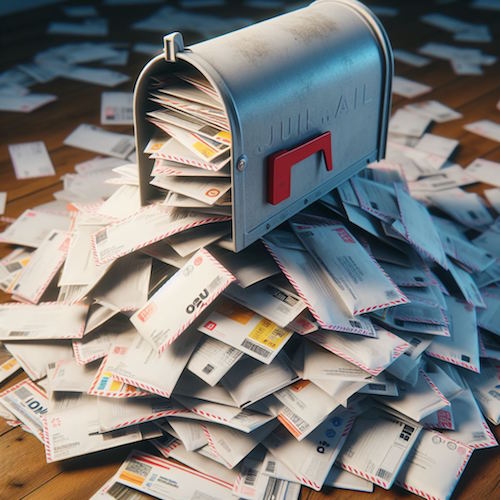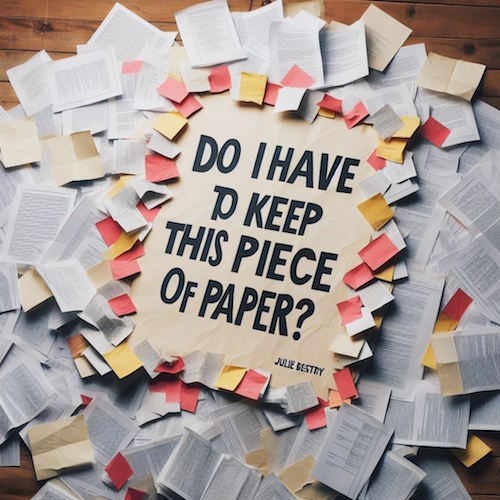Paper Doll Shares 12 Kinds of Paper To Declutter Now

After last week’s 24 Smart Ways to Get More Organized and Productive in 2024, we continue with GO Month, an entire month devoted to getting organized and being productive. I thought it might be time to hit a classic Paper Doll topic topic: decluttering papers!

Quite often, Paper Doll focuses on the papers and documents you need to acquire and keep. Always start with the essentials:
How to Replace and Organize 7 Essential Government Documents
How to Create, Organize, and Safeguard 5 Essential Legal and Estate Documents
The Professor and Mary Ann: 8 Other Essential Documents You Need To Create
Ask Paper Doll: Do I Really Need A Safe Deposit Box?
However, we must also look at what we no longer need, and what papers we’d be better off without.
OLD RECEIPTS
Some people throw out all of their receipts. Their desks, bags, dresser-tops and bedside tables are clear of crumpled papers, but they have trouble reconstructing their financial history at tax time, they can’t figure out where their cash went, and can’t prove ownership or value of high-ticket items.
More often, people go to the opposite extremes and keep all of their receipts. When working with clients, I’ll often find zip-locked bags and drawers filled with random receipts. In addition to receipts strewn about, the collected and squirreled-away receipts tend to be older, anywhere from a year to five+ years in the past.
These clients have a vague sense that someone once told them to save receipts in case they needed to return something or create a budget based on tracked expenses. The problem? Neither of these well-intentioned reasons are based on a realistic view of their paper-cluttered lives.
Yes, you should hold onto receipts for purchases you might return, but most return policies that limit how long after the purchase something may be returned. In general, you’ll need the receipt to return something for a full refund for up to 30 days after purchase; after that, the best you can hope for at most retailers is store credit. (Stores vary, and Nerd Wallet has a great piece, Return Policy Guide: What to Know and Which Stores Stand Out, on the most generous return policies at stores like Costco, Kohl’s, and IKEA.)
Similarly, if you were going to track your expenses to create a budget, receipts from years ago won’t help now. Paper Doll gives you permission to start fresh with January (and last week’s receipts) and let go of the bulk of your random receipt clutter.

Woman with Receipts Photo by Karolina Grabowska at Pexels
Reasons to Keep Receipts
There are five main reasons to keep receipts, and none are “forever” reasons:
1) The item is returnable — only keep the receipt until the return period ends.
2) It’s a big-ticket item — keep a Big-Ticket Purchases folder for these kinds of receipts in your financial filing section.
Figure out your comfort level to determine whether “big-ticket” is $50 or $500 or $5 zillion; if the receipt is above a certain threshold, you may want to add a rider to your homeowners or renters insurance policy.
The IRS allows taxpayers to choose between deducting state taxes and sales tax; if you opt for sales tax, the default amount is often the wisest option; however, you’ve purchased a house, auto, boat, private plane, or personal rocket ship, you’ll definitely want proof of that big ticket deduction.
3) The receipt helps you prove ownership. This tends to go along with Big-Ticket items, as you’ll rarely be asked to prove that the soon-to-be-moldy asparagus in your fridge actually belongs to you.
4) The receipt is for something tax-deductible. Non-business purchases are more likely to be deductible if they’re related to healthcare, government fees or taxes, child/dependent care, or tax credits for things the government is trying to promote, like environmentally beneficial or energy efficient home improvements.
5) The purchase will be reimbursed by someone (employer, insurance company, etc.) at a later date.
Additionally, if you’re divorcing and seeking alimony and/or child support, you may need to collate receipts to prove the costs of life maintenance.
Here are some basic guidelines for the receipts you can discard, with a few caveats.

Crumpled Receipt Photo by Michael Walter on Unsplash
Cash Receipts
- Let go of cash receipts for consumable products (like food and beverages) whenever you want. If you’re not tracking expenses, you can toss them immediately. You can even refuse to accept receipts.
If you buy a Slushie at 7-Eleven or a burrito at the taco truck and pay with cash, you’re generally safe tossing receipt — unless you watch too many Law & Order reruns and are convinced you need to be able to prove your time-stamped whereabouts at all times.
- Keep cash receipts for things you might return, but only for the duration return period. After the return policy, buh-bye!
For example, if you buy clothes, a toy, or anything for your home, car, or family with cash, keep a plain #10 envelope to stash purchase receipts. Keep the envelope near where you handle your daily finances so that you know where to find receipts if you need to make a return.
Set a reminder, perhaps on the 5th of every month, to flip through the receipts. Once past the store’s return policy, shred the receipt.
The above assumes you’re not buying fancy-pants, expensive things with cash (and that you are not a member of a Sopranos-style crime family. If you are, please confer with your accountant.)
Debit and Credit Card Receipts
- Keep debit and credit card receipts until the return period has expired and you’ve eyeballed your statement or online account to verify that the final price is accurate.
As with cash receipts, pop credit card and debit card receipts in that #10 envelope. If you get paper statements for your bank and credit card accounts, reconcile the values monthly when your statements arrive. If you no longer get statements, reconcile receipts against your running online account weekly.
Deposit Slips and ATM Withdrawal Slips
If you think about it, a deposit slip is really a receipt, only instead of paying a store or service provider for what they’ve given you, you’re paying the future version of yourself who will spend that money later.
As for the five reasons to keep receipts, none particularly apply here. If you wanted to return the cash you withdrew, you could do that without the ATM slip, and taking or giving back your own money doesn’t involve tax deductions. Reimburse-ability doesn’t apply. The “big ticket” status isn’t applicable with withdrawals (as banks limit how much you can take out in one day); deposits are a little stickier, as there’s a paperwork rigamarole to go through if you ever deposit more than $9,999.99.
Of course, if you’re sort who worries about that pesky Law & Order issue regarding your whereabouts, you might also fear having to prove ownership of the money you’ve withdrawn.
In general, treat these as if they were debit or credit card receipts, and save them until your bank has accurately recorded the information. (But if you are making manual deposits of $10,000 or more, note the purpose, save the receipts, and tuck them in your tax prep folders just in case the amounts are questioned in an audit.)
A Few Other Notes About Receipts
Your pharmacy will print a summary of all prescription purchases. Once you’ve checked your receipts against your bank or credit card statements, you can shred pharmaceutical receipts; just ask your pharmacy to provide printout in early January for the preceding calendar year. (It’s to your benefit to only use one pharmacy so you don’t have to keep track of these things. If you must use a different pharmacy — if you’re on vacation or your regular pharmacy is out of your prescription medication — save those receipts.)
Collect all receipts for tax-deductible expenses (like charitable donations, or medical and pharmaceutical expenses in your Tax Prep hanging folder until you’ve completed your taxes for the prior year. (You won’t know until the end of any given year whether you accumulated a high enough percentage of your adjusted gross income to deduct itemized expenses.)
Keep receipts for anything for which you are due reimbursement until you get paid. This may include:
- Work and travel-related expenses where your company reimburses you. Label a folder “Reimbursable Expenses” and toss receipts in there. Set a reminder on your calendar for the week prior to when expense reports are due, to ensure you don’t put it off and delay recouping your costs.
- Healthcare expenses for which your health insurance company reimburses you. Usually, you pay a co-pay or co-insurance to a healthcare provider, but sometimes providers won’t file insurance claims. You may have to submit documents from the provider, plus your receipt, and forms directly to your insurance company to get reimbursed for medical expenses.
- Sometimes, you’ll need to submit receipts to your car or homeowners/renters policy insurance company for repairs done to your auto or home. You might need to submit receipts to someone else’s insurance company if the other party was at fault. Always keep the original and provide them with photocopies).
If you’re reimbursed for a high-dollar amount for anything unusual, keep the receipt and the proof of reimbursement in your tax prep folder. If audited, it will be easy to say, “Hey, I anticipated that you’d wonder about this! So, here’s the receipt where I chartered a helicopter to get my boss to the top of the mountain for a super-important meeting, and here’s the income you’re questioning, where I was reimbursed for what I paid out.”
Always have a system for collecting your receipts until you get home. Do not stuff receipts in your coat pocket, no matter how many people are behind you in line. Do not put receipts in the shopping bag, because it’s too easy for them to fall out in the car, or for the bag to be discarded with a receipt still inside. Make 2024 the year you resolve not to have any crumpled receipts in your pockets or your car!
[We’ll take a fresh look at digital receipts in a future post, but the rules regarding what you can let go of are the same for digital as paper.]
OLD HOUSEHOLD UTILITY BILLS
It’s common for me to find that clients have saved multiple years of old electric, gas, water, and sewer bills. They shrug. Someone, somewhere, told them they were supposed to save all records.
People’s parents (particularly fathers) rightly told them that it’s important to keep all records regarding auto maintenance. A full and detailed record helps boost the resale value of a car. (Secondarily, if there’s a recall, the car owner can get reimbursed for work previously done.)
The thing is, even if you keep meticulous records, a prospective home buyer isn’t going to offer you more for your house based on ancient utility bills. Knowing what it cost to heat your home in January or cool it in July back in 1992 is not useful information!

Little House Photo by Kostiantyn Li on Unsplash
Keep paper utility statements for the prior calendar year and the current one, just so that you can easily compare year-to-year (for example, to trace the likelihood of a leak vs. “Oh, yeah, July water bills are always high because we use the Slip & Slide). Shred the older ones.
(Note: if you take a tax deduction for a home office for your home-based business, keep utility bills as supporting documents for business tax returns.)
OLD INSURANCE POLICIES
People have a habit of keeping really old insurance policy paperwork.
I advise that if you don’t have any pending claims against your insurer and nobody has a lawsuit against you, it’s OK to shred old declaration pages and toss the generic boilerplate from old home and car policies. You may want to keep the front page of the policy listing the old policy number and contact information for the insurer.
With health insurance policies, if you’ve changed policies recently, I find it’s helpful to keep the paperwork related to coverage you had in the prior calendar year. While medical providers are supposed to process claims within 90 days, I’ve seen where physicians’ offices were so disorganized they were trying to recoup fees (either through insurance or directly from patients) more than a year later. Keeping the essential info about the policy can help if you get caught with “zombie” claims. But policies older than the prior calendar year, unless you’re still fighting about claims, can be shredded.
One insurance policy caveat: If you cash in a life insurance policy, either for the cash value or after someone has passed, make sure you log that you have done so. I’ve worked with clients where there’s been great excitement upon finding old life insurance policy paperwork, only to learn the original policy holder cashed in the policy up to 50 years earlier, but never destroyed or discarded the old paperwork. Bummer.
For clarity, if you cash in a policy, make a note somewhere accessible (like your inventory of assets and debts) so that your future fuzzy brain or your inheritors can make sense of what happened.
EXPIRED WARRANTIES
If the warranty or guarantee period has already expired, toss out the warranty/guarantee card. (If it was a bigger ticket item and you’d stapled the receipt to the warranty card, make sure the receipt gets saved.)
If you no longer even own the product associated with the warranty or guarantee, dunk it like a basketball! Swoosh! (But shred the receipt.)
MANUALS FOR THINGS YOU DON’T OWN (AND SOME YOU DO)
If you don’t own the thing anymore, you don’t need the manual!
If you own the thing, but know how to use it, you don’t need the manual! (I often joke that if you don’t know how to use your toaster or hair dryer, you have a bigger problem than clutter.)
For guidance, there are ways to pare down and organize your manuals, find digital alternatives, or even digitize your collection to help keep things streamlined:
Paper Doll’s Manual Override – Part 1: Declutter and Organize Owner’s Manuals
Paper Doll’s Manual Override – Part 2: Twelve Resources To Find An Owner’s Manual
Paper Doll’s Manual Override – Part 3: Create & Organize A Digital Owner’s Manual Library
OLD DRIVING DIRECTIONS MADE REDUNDANT BY GPS

As you go through your files and piles of old papers, you may find driving directions to anywhere from hotel venues to summer camps to doctor’s offices.
If you’re never going there again, toss the paper. If Siri or Google Maps can get you there, toss the paper. If there’s anything special about the directions (maybe for the last tenth of a mile) and you could get the information again easily, toss the paper. If that last bit of the trip requires special instructions, create a contact (for the venue, the camp, or the office) in your phone and put those final, special directions in the “Notes” field.
DUPLICATE DOCUMENTS
Have you ever accidentally printed a copy of something multiple times and kept the copies? If the item is a form or a template you have to share (physically) with others and can’t just forward a digital file, make a folder. But if you just have random duplicate or triplicate or seventeenplicate of something you printed for no discernible reason, recycle or shred, as applicable.
OLD BOARDING PASSES
Yes, most of us now use digital boarding passes, but if anything changes about your flight, the nice typey-typey airport people will give you a new set of paper boarding passes. When you get home, don’t toss them in a pile with other crumpled receipts. Old boarding passes are of no future use to you. Shred them!
FYI, those QR codes along the edges have all sorts of personally identifiable information about you. They may not be useful to you, but leaving them out on your desk for anyone to find makes it easier for someone to purloin that information.
OLD CONFERENCE PAPERS AND BINDERS
Not all conference material is created equal. Go through your old conference binders and folders, especially those from early in your career. Be ruthless about letting go of handouts and notes related topics that no longer interest you or fields of study in which you never worked, or never intend to work again.
Trust that any information you want can be found again, and found more easily than spelunking in piles of old binders in the back of a closet.
Similarly, get rid of flyers, programs, and any other conference materials that don’t contain essential information.
JUNK MAIL

Did you ask for it? Do you want or need it? No? It’s junk! Instead of letting it pile up, shred it and sent it on its way. To stop junk mail in its tracks:
- Opt out of credit card and insurance offers for 5 years by going to optoutprescreen.com or call 1-888-5-OPT-OUT (1-888-567-8688), operated by the major credit bureaus. You’ll have to supply personal information like your name and address. They’ll also ask for your Social Security number and date of birth; it’s optional, and they’ve always claimed it’s confidential, but this is the 21st-century, so who knows?
- If you prefer to opt out permanently, start the process at optoutprescreen.com or call 1-888-5-OPT-OUT, but to complete the request, they’ll make you sign and return a Permanent Opt-Out Election form.
For other kinds of marketing junk mail, register at the Direct Marketing Association’s (DMA) consumer site, DMAchoice.org and pay a $4 processing fee for ten years of protection from most (but not all) junk mail.
OUTDATED, LOW-QUALITY, OR IRRELEVANT INFORMATION
I once worked with a (very) organized author. I initially joked that I wasn’t sure how I could help, as her office seemed orderly and tidy. However, when we looked in her files, I saw the problem.
The client wrote novels with storylines that included medical information, so she’d saved a few decades of internet printouts regarding diagnoses and treatments of various conditions. In almost every folder, any clip from the web from more than two or three years earlier was completely outdated. While some fields may include timeless information, research related to the sciences is likely to be superseded by newer data and analysis each year.
Unless your actual job description requires analyzing what used to be advised or believed vs. what is now known to be true, toss the outdated information.
Similarly, let go of any clipped articles or printouts that reflect information you already know (or that has become common knowledge), that has been disproven, lacks credibility, or isn’t related to your work or interests.
Tips from 1999 on traveling to Europe won’t fly (pun intended) in a post-9/11 world, but even advice from pre-COVID may not be valid. Introductory-level parenting articles from when your kids were tiny might have been useful, but if you’re cruising toward grandparenthood, you’ll find guidance has changed. Just let the internet be your filing cabinet!
DAMAGED PAPERS
This should go without saying, but discard any papers that are damaged due to water, fire, or animal predation. Papers with tiny blobs of mold can damage your neurological and pulmonological health. If a piece of paper is readable but yucky, digitize it (but then disinfect your scanner).
FINAL RESOURCES
You’ll be delighted to lessen your paper clutter knowing that much of what you’ve saved (due to misinformation, fear, or just plain inertia) can go. However, anytime there’s anything personally identifiable in your papers, make sure you shred them.
Paper Doll’s Secrets: Shred Successfully & Save Money is a good resource for making it easy to destroy what you don’t need and prevent identify thieves and other sneaky folks from benefiting from your decluttering.

Finally, knowing what to get rid of is only part of the paper decluttering process. For a full-on look at strategies for knowing papers to keep, and for how long, check out my classic ebook, Do I Have To Keep this Piece of Paper.




I’m going full steam ahead with my digital receipts. Because my business and personal have an accordion folder to store these receipts, I have been saving them physically. But now, I am going to digitize them when I get them. I invested in a fast scanner, and boy, is it fast. It takes two seconds to scan several receipts at once. I made folders for each of the categories I used and created Scannable PDF versions, which will make it even easier to search these receipts. Thanks for sharing your thoughts! I always learn so much from you. =)
Thanks for your perspective. I definitely will talk about digital receipt management in the future, as it’s been about a decade, I suspect, since the last time I reviewed the apps and process. (The problem with blogging for 17 years…every topic needs to be updated!) I definitely believe that digital can be advantageous, especially for professionals, but I’m not about to tell my seniors or overwrought moms that they have to add a digital layer to their lives. 😉
I’m curious, what kind of scanner do you use?
Love the information about receipts. I have many discussions on this very topic with clients. I usually share how I maintain my receipts and why but then always end with, “But you must do what is comfortable for you.”
I personally keep receipts until statements are reconciled and then let them go. I also hold receipts even for cash in my wallet until I register the amounts into my paper budget ledger – don’t laugh – it works for me. Monthly I take that info and consolidate it into my budget spreadsheet.
Absolutely; we’re humans, and we won’t commit to systems that don’t “feel” right to us. I have a hybrid system for receipts. Unlike Sabrina, above, I’m not going to scan my receipts, but when they ask me at the point of purchase whether I want a printed or emailed receipt, I opt for the digital version for anything that might be tax-related (so, for my business) and paper otherwise, so I can return something if necessary, or toss once I’ve reconciled accounts.
And I wouldn’t laugh; if someone (like you) actually DOES track expenses, then obviously, it’s worth going to the effort. The problem is all the times people save receipts but never track expenses!
We tend to keep current receipts for the year as a matter of habit. My husband is pretty cautious. However, I have learned to let those from cash purchases go, especially those for small things (which tends to be mostly what I use cash for). I spent many hours shredding old receipts during COVID, and I think that has made me more discerning.
I don’t deduct utility bills for my tiny home office area, but that is an important exception to note!
I am laughing that you are talking about old boarding passes. This must be a thing!! My husband has always kept these. I think, in his mind, they are sort of like badges for honor for all the business travel he has done. Funny, right? I’m glad to know he isn’t the only one. I’ll have him read this post and maybe we can change his mind…
Oh, Seana, SO many people still have paper boarding passes, probably because they think of them as mementos (because they don’t stop to think deeply). It’s a huge undertaking to work through the details with a client, like, “Yes, this boarding pass reminds you of your trip to California, but what does it offer you that your photos, your Mickey Mouse Disneyland ears hat, and your blown-up post of you in front of the Hollywood sign don’t?” Maybe what your hubby needs is something like a printed map of all the places he went while working those jobs. Is the January 2007 flight to Chicago meaningfully different from the one in April 2009?
As for receipts, I get your husband’s caution, but the best way to be cautious but wise is to talk through the discussion. Is a receipt, from your home town, for a slice of pizza, going to be useful? In what circumstances (notwithstanding the Law & Order proof of location scenario)? Is there a tax implication of him eating that pizza on a Saturday, when not on a work trip? What about the receipt for a toothbrush that he’s already taken out of the package and used for a week? (It’s unlikely he’d return that, right?) The key is to get in the habit of asking the questions that allow him to feel entirely secure. Drilling down to the unrealized fears is the only way most people, I suspect, get past them.
I’m about to clear out my year-end paper and prepare my files for 2024. So, reading your post got me all excited. That’s probably not the typical reaction when people think about going through paper. But I LOVE shredding, filing, and letting go of what’s no longer needed.
Over a year ago, I went through my bazillion organizing conference binders and notes. I was determined to edit and keep only a few. I made a list of all conferences attended (dates, organization, location) because I wanted to keep that information. But I released most of the physical paper. Nowadays, most conferences give us digital handouts, so there is less paper. But I’ve been going to conferences for 30 years, so you can imagine how much volume I collected.
I have a good system for logging and letting go of receipts throughout the year. My husband knows where to put them. I log them into Quicken and shred or file them weekly. So when it’s time to close out the year, it’s an easy thing to do.
Thanks for the great post and the decision-making parameters you shared. Awesome and well-timed, as always!
I understand the excitement — it’s not that purging and shredding is exciting, per se, but that evicting straggling unwanted strangers from our midsts gives us space and energy to focus on what matters.
I’ll always be a paper person. I hate reading books online, and even fillable PDFs just don’t give me the flexibility that paper does. But even with that, I know that there are sessions handouts from conferences where the handouts were for sessions I purposely didn’t attend because there were others that interested me more. I think for “completists” like me, that’s the hardest thing, to let go of what we don’t need that we consider part of a set. But it always comes down to — does this serve my purpose?
Thanks for reading!
This is a terrific post, Julie. I can’t tell you how many clients have ALL their insurance information – each and every update, or all their user manuals – even for things they no longer own. It is so freeing to release these papers. Then there are the years of utility bills or credit card statements. And on we go.
I do most everything online and rarely hang on to a receipt unless it is for a high value item.
It very much depends on a person’s comfort level and their digital filing system.
Thank you for all this great information!
I think the hardest part of making a decision to let something go is lacking the full picture of why you should keep something in the first place. When I ask a client, “OK, this policy you had from 1985 until 1995 — did you have any accidents where there was a lawsuit, or where somebody got injured and needed medical care? No? OK, then nothing about this policy is useful to you. Yes, I get that you had a nice agent at the time, but you tell me he was in his mid-60s when he signed you up? That would make him about 104 right now, so you probably wouldn’t go back to him if you wanted to switch agents, right?”
Sometimes, I say it deadpan, others in a way that shows I’m obviously kidding, but seeing the whole picture, logically but also emotionally, helps clients feel confident about making that decision. In the end, they can always write down the name and phone number of that agent who likely retired before the Berlin Wall fell, but they don’t need the boilerplate book from three insurance companies ago.
This is a wonderful post, and yes to all the details you shared. I’ve lately convinced some clients to go digital, paper is only adding to their stress of decluttering. I also love that you can get all your airline passes on your phone or watch and never find them shoved at the end of a drawer again. I have to admit though that I used to save them to add to our photo albums, but that’s now a thing of the past too. Thanks for all the info Julie.
Thanks for reading and for your comments.
I agree that paper is stressful, but there’s still a not-insignificant band of people for whom the tech is stressful. Not just people who aren’t adept at tech, but those for whom a visual reminder, or more specifically a tangible one, allows them to fully comprehend math/numbers-related concepts. For some people, the minute something is online/digital, it ceases to seem “real.” So, we need solutions for everyone. A future post will tackle the digital — revisiting automation of payment vs. manual payments, digitizing receipts (and accepting receipts via email instead of printed versions), and more.
Boarding passes! Shred them now! 😉